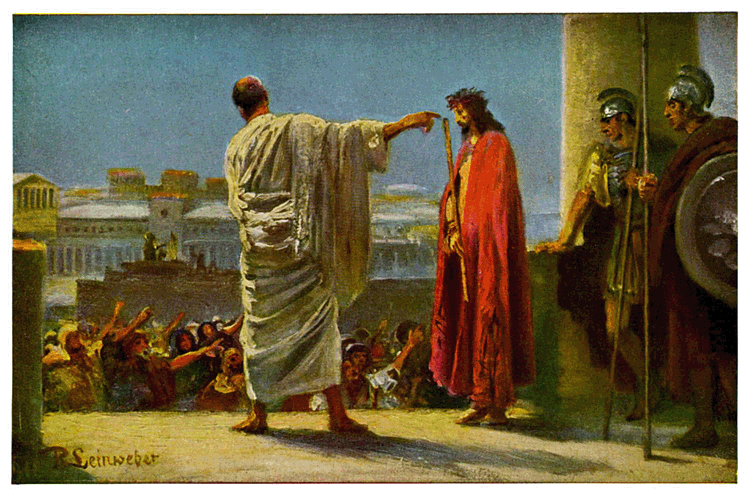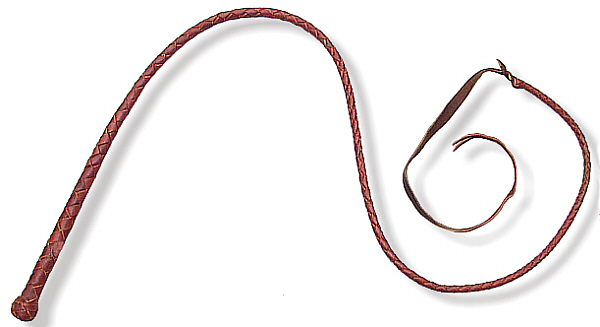The Book of Job is a classic and age old story of religious “experts”, who are actually fools, clashing with the Truth of who Elohim really is. From time immemmorial, finite man has been trying quantify the Creator and stuff him into boxes that can be labeled and marketed for personal gain and glory. Most churches, denominations, seminaries and religious movements are guilty of this. Elohim is much bigger than this and refuses to play this silly and childish game as the Book of Job reveals. He is who he is and he is infinite and his ways are beyond man’s ability to understand. So just shut up, accept him in faith, worship and obey him knowing that he loves you and has your best interests in mind. When you walk with him, no matter what you have to go through, he will lead you to the other side and bless you immensely.
Category Archives: Trials and Persecution
A “Thorn” in the Flesh Explained & How to Turn Weakness Into Strength
A Thorn in the Flesh—Strength & Perfection Through Weakness

A “Thorn” in the Flesh to Keep Us Humble
For though I might desire to boast, I will not be a fool; for I will speak the truth. But I refrain, lest anyone should think of me above what he sees me to be or hears from me. And lest I should be exalted above measure by the abundance of the revelations, a thorn in the flesh was given to me, a messenger of Satan to buffet me, lest I be exalted above measure. Concerning this thing I pleaded with the Lord three times that it might depart from me. And He said to me, “My grace is sufficient for you, for My strength is made perfect in weakness.” Therefore most gladly I will rather boast in my infirmities, that the power of the Messiah may rest upon me. Therefore I take pleasure in infirmities, in reproaches, in needs, in persecutions, in distresses, for Messiah’s sake. For when I am weak, then I am strong. (2 Cor 12:7–10)
You have no doubt heard the expression, “Take your lemons and make lemonade.” Translated, that means, take the bad things that happen in your life and make something good out of them. Or, to state it another way: find the blessing in every situation in life. That is not always easy to do, especially when you are experiencing trials, persecution or suffering whether it be health issues, financial problems, spiritual attacks, constant danger, civil unrest, pandemics, war, or evil people as well the forces and influences of antichrist societal conditions. Many of these situations are chronic in that they are continual and we are powerless to change or avoid them. What then? As we learn from Paul’s thorn in the flesh passage in 2 Corinthians 12, when YHVH is in the picture of your life, the spiritual lemons can become lemonade, and out weakness comes strength. Or to put another way, YHVH gives beauty for ashes, the oil of joy for mourning and the garment of praise for the spirit of heaviness (Isa 61:3)! Let us now explore the implications and dynamics of this powerful concept and discover how to move into this place of strength and blessing out of weakness.

It is pointless to speculate as to what Paul’s thorn in the flesh or messenger of Satan was that was chronically afflicting him (2 Cor 12:7). Whether it was a physical disability, another person to whom he was irrevocably yoked such as an unbelieving wife or some other life situation over which he had no control, we do not know. But there is one thing we can deduce from this scripture passage. This thorn over which he had no control provided an opportunity for the devil to continually torment him. It was like a spiritual open door in his life over which he had no control that allowed the enemy to attack him directly and continually. Thus he had no choice but to endure it, since this was the proverbial hand of cards life had dealt him, and YHVH allowed it and for is spiritual betterment. (The same thing happened to Job!) As such, Paul took his proverbial lemons and made lemonade. That is, he took this weakness in his life and by the grace of YHVH turned it into a spiritual strength. To apply another metaphor to this discussion, instead of lamenting over his situation with a woe-is-me victim mentality or instead of seeing the glass as half empty, he chose the higher road of seeing the glass as being half-full. He chose to find the blessing in his difficult situation. He realized that this was an opportunity for spiritual refinement and strength building for the glory of Yeshua in spite of his trying situation. And after all, didn’t Yeshua have to walk down this same road himself? Being in the flesh and divesting himself of his glory was his monumental, and not to be underestimated “thorn in the flesh” . Yet it was necessary that he endure this physical existence all the way to the cross where he was murdered by the same humans he had created ex nihlo. He had to drink this cup of suffering in order to be our Savior. If he did this for us, can we, for his sake, not endure small amount of buffeting that we experience in our life?
There are several things that a thorn in the flesh is not. It is not normal trials, suffering, persecution or tribulations that come as a result of being a serious the Christian (1 Pet 4:12–14). Also it is not suffering for the consequences of our own wrong actions (1 Pet 4:15). Rather, it is a specific situation that we cannot change, and which YHVH allows to remain in our lives for our spiritual refinement. At the same time, it is true that even in non thorn-in-the-flesh situations including the normal trials, persecution and suffering of this life, we still can learn to find the blessing and YHVH’s higher purpose four us in these as well.
The Example of Yeshua Being Humbled

It goes without saying that as Christians that Yeshua is our ultimate example to follow. When we came into a covenant relationship with him, we were baptized not only into his life, but also into his death and resurrection. There is no resurrection without death first. That means embracing the process of dying to self and all that it entails—not an easy process! Yeshua was made complete through humbling by taking on the weakness of humanity and enduring the shame and ignominy of ridicule, false accusation, blasphemy, rejection, betrayal and ultimately murder.
Let nothing be done through selfish ambition or conceit, but in lowliness of mind let each esteem others better than himself. Let each of you look out not only for his own interests, but also for the interests of others. Let this mind be in you which was also in Messiah Yeshua, who, being in the form of Elohim, did not consider it robbery to be equal with Elohim, but made Himself of no reputation, taking the form of a bondservant, and coming in the likeness of men. And being found in appearance as a man, He humbled Himself and became obedient to the point of death, even the death of the cross. Therefore Elohim also has highly exalted Him and given Him the name which is above every name… (Phil 2:3–9)
He is despised and rejected by men, a Man of sorrows and acquainted with grief. And we hid, as it were, our faces from Him; He was despised, and we did not esteem Him. (Isa 53:3)
Then He answered and told them, “Indeed, Elijah is coming first and restores all things. And how is it written concerning the Son of Man, that He must suffer many things and be treated with contempt? (Mark 9:12)
For even The Messiah did not please Himself; but as it is written, “THE REPROACHES OF THOSE WHO REPROACHED YOU FELL ON ME.” (Rom 15:3)
For you know the grace of our Lord Yeshua the Messiah, that though He was rich, yet for your sakes He became poor, that you through His poverty might become rich. (2 Cor 8:9)
Inasmuch then as the children have partaken of flesh and blood, He Himself likewise shared in the same, that through death He might destroy him who had the power of death, that is, the devil… (Heb 2:14)
[L]ooking unto Yeshua, the author and finisher of our faith, who for the joy that was set before Him endured the cross, despising the shame, and has sat down at the right hand of the throne of Elohim. (Heb 12:2)
Also consider the following Scriptures.
And whoever of you desires to be first shall be slave of all. For even the Son of Man did not come to be served, but to serve, and to give His life a ransom for many.” (Mark 10:44–45)
For who is greater, he who sits at the table, or he who serves? Is it not he who sits at the table? Yet I am among you as the One who serves. (Luke 22:7)
For I have come down from heaven, not to do My own will, but the will of Him who sent Me. (John 6:38)
If I then, your Lord and Teacher, have washed your feet, you also ought to wash one another’s feet. (John 13:14)
Now I say that Yeshua the Messiah has become a servant to the circumcision for the truth of Elohim, to confirm the promises made to the fathers… (Rom 15:8)
For we do not have a High Priest who cannot sympathize with our weaknesses, but was in all points tempted as we are, yet without sin. (Heb 4:15)
[T]hough He was a Son, yet He learned obedience by the things which He suffered. And having been perfected, He became the author of eternal salvation to all who obey Him… (Heb 5:8–9)
If we are to walk with Yeshua and as he walked, will not the same occur to us? Is this not the ultimate laying down of one’s life, as he did? Is this not being conformed to his death in order to gain the highest reward? After all, Yeshua paved the way for his soon to be glorified and resurrected saints when he resurrected from the head, ascended to heaven where he is now at the right hand of his Father. A similar reward awaits those now who have put their faith in him and are overcoming the constant attacks of the world, flesh and the devil.
Continue readingIslam and Hamas: YHVH’s Instrument to Bring His People to Repentance and Spiritual Revival

The Ancestry of Modern Arabs
The conflict between the Jews (and Christians) and the Arabs has ancient roots. In Genesis 32, Esau (the father of many of the modern Palestinians) and his army stood in the way preventing Jacob (the father of Jews and Israelites) and his descendants from returning to their homeland—the land YHVH had promised to them. This historical event is prophetic of what will happen in the end times as the Jews and the rest of the Israelites endeavor to receive their promised inheritance and the kingdom of Elohim.
Not only that, YHVH used Esau to test Jacob, who had grown overly self-confident due to his business acumen, wealth and his ability to produce a large family clan. In the ancient world and in a tribal sense, he had reached the pinnacle of wealth and power. However, what mattered to YHVH more than these things was the character of a man. Would Jacob have faith in his Creator, or would he trust in his own abilities to outwit his adversaries and come out on top as he had done twice previously with his brother Esau and Uncle Laban? Jacob’s confrontation with his brother at the threshold of the land of Israel and his wrestling with the Messenger from heaven were the two tests that he had to pass. The Bible calls this Jacob’s Trouble and prophesies that something similar will occur in the end times to Jacob’s descendants(Jer 30:7).
As we read in Genesis 32, Jacob divided his wives and children into two camps (Gen 32:1, 7). This was prophetic of what would eventually occur to the nation of Israel after the death of King Solomon. The one nation of Israel became two houses or kingdoms—the Northern Kingdom of Israel (Judah) and the Southern Kingdom of Israel (or the northern ten tribes). The descendants of these two kingdoms are presently—loosely speaking—the Jews and the Christians (we have discussed and proven this point biblically elsewhere). But who are the descendants of Esau historically and, more importantly, today, and why is it important to know?
Many, if not most of the modern Moslems (especially the Arabs) trace their lineage back if not biologically then spiritually to Ishmael, the son of Abraham by Hagar. Islam in its religious book, the Koran, claims that it was Abraham and Ishmael who founded the religion of Islam and built the Kaaba, which is the small building containing a stone that supposedly fell from heaven. This shrine is located in the midst of the great mosque in Mecca, Saudi Arabia. Of Ishmael and his descendents, the Bible prophesies in Genesis 16:11–12,
The Messenger of YHVH said to her further, “Behold, you are with child, and you shall bear a son; and you shall call his name Ishmael, because YHVH has given heed to your affliction. And he will be a wild donkey of a man, his hand will be against everyone, and everyone’s hand will be against him; and he will live to the east of all his brothers.”
The Koran has further twisted the biblical account to declare that the biblical patriarchs were Muslims, and that Abraham gave the birthright blessing to Ishmael instead Isaac. Both Israelites and Arabs, therefore, believe that they have a right to the Promised Land of Canaan, which is the roots of the modern Arab-Israeli conflict.
We now need to add another player into this biblical drama. The Bible records that Esau (or Edom), the disinherited son of Isaac, also had ought against his brother Jacob, who, in a sense, stole the birthright promise from him. Furthermore, Esau married the daughter of Ishmael (Gen 28:9). Thus, some of Ishmael’s and Esau’s descendants intermarried becoming a people-group who had a jealous feud with the sons of Jacob or Israel. Again, this ancient family feud has continued in one form or another to the present day.
The Bible has more to say prophetically about the descendants of Esau, who scripturally are referred to as Edom (Esau’s alternative name, Gen 25:30; 36:1, 8) than about those of Ishmael. Edom is portrayed as an aggressive and bloodthirsty people who are opposed to Israel at every step. We will discover what the Scriptures have to say about this below.
In the mean time, let’s take a closer look at Edom.
- Esau and Edom (meaning “red”) are synonymous names biblically. In other words, Edom was Esau’s nickname (see Gen 25:25, 30; 36:1, 8–9, 19, 43).
- Esau intermarried with the descendants of Ishmael (Gen 28:9).
- Seir is another name for the land of Edom (Gen 32:3; 33:16; 36:8).
- Esau intermarried with the people of Canaan (Gen 36:2). He intermarried with the Hittites, the Hivites, as well as the Ishmaelites.
- His descendants included the Amalekites (Gen 36:12, 16) who fought against the children of Israel upon leaving Egypt and as soon as they had entered the wilderness en route to the Promised Land (Exod 17:1).
- Esau’s sons were dukes or chieftains (leaders of clans) and kings (Gen 36:15–16, 40–43).
- Although Esau’s direct lineage was confined to the area of the traditional land of Edom, it is clear from the biblical record that he and his descendants intermarried with many of the neighboring nations, so that his descendants were scattered far and wide over the region that later became known as the Holy Land and Palestine.
The entire one-chapter Book of Obadiahis a prophecy against Edom. Let’s note several key points in this prophecy that might help us to understand who Edom is in the end-times. This will in turn help us to understand end-time world politics as prophesied in the Bible some 2500 years ago! Let’s now analyze some key verses in Obadiah to discover who the modern players are in this drama.
Verse 2, The descendants of Edom are greatly despised (scorned, held in contempt, disdained).
Verse 3, They dwell in the clefts (places of concealment, retreats) of the rocks (tunnels or caves in the rocks), and they are proud and view themselves as invincible.
Verse 4, YHVH promises to bring Edom down.
Verse 7, Edom has a confederacy (league, alliance) of nations, which include many of the modern Moslem nations.
Verse 10, Regarding Edom, this verse speaks of his violence against his brother Jacob. Interestingly, the Hebrew word for violence is khawmawce or hamas, which ironically is the names of the terrorist organization that rules the Gaza Strip and is an archenemy of the nation of Israel. The word khawmawce can also mean “wrong, cruelty, injustice, false, injustice, oppressor or unrighteous.”
Verse 11, Edom’s eyes are on Jerusalem. Edom along with his foreign allies will cast lots for possession or control of Jerusalem.
Verse 13, Edom has entered into the gates of the land of Israel in the day of her calamity or disaster.
Verse 14, Edom will kill Jewish refugees trying to escape the land of Israel in her time of distress.
Verse 15, The time-frame of the fulfillment of these prophecies is “near” the day of YHVH, when he will judge Edom and the other heathen nations.
Verse 16, Edom will be drinking (celebrating?) on the Temple Mount in Jerusalem or YHVH’s “holy mountain,” and as a result, they shall drink the cup of YHVH’s wrath. When this prophecy was written, the Jews controlled the Temple Mount. Now the Muslims control it.
Verse 17, The house of Jacob will get the Temple Mount back.
Obadiah’s description of Edom contains many striking descriptions of the modern Palestinian and other Islamic terrorists who hate the Jews and want the land of Israel for themselves. What other people-group could possibly fit this description than the Moslems? Not only do the Moslems want the land of the Jews, they want the land of the Christians as well, and they’ve made public their intent on conquering these nations.
In end-times Bible prophecy, Jacob is a prophetic archetype or picture of those who physically and spiritually descended from him, namely, the Jews and the Christians, or as the Koran puts it, “the people of the book”—a reference to the Bible. Edom or the modern-day Moslems are the arch-enemy of Jacob’s descendants, who YHVH will use to test and discipline the Jews and the Christians because they have turned away from him and put their trust in themselves. Until they pass this test, repent of their backsliding ways and put their faith in YHVH Elohim, they, like Jacob of old, will not be able to enter into their promised spiritual inheritance—the kingdom of Elohim. This test will be happening in the end times before the coming of the Messiah.
Edom Has a Perpetual Hatred for Jacob (Judah and Ephraim)
As we have noted, Edom’s hatred for Israel has its roots in the antagonism between Ishmael and Isaac, and then afterwards between Esau and Jacob. The murderous hatred that Esau had for Israel has been passed on down to successive generations of Edomites to the very end times. Let’s review some other biblical prophecies that speak of this.
Ezekiel chapters 35 and 36 also speak about the conflict between end-times Edom and end-times Israel. In verse two of chapter 36, we see that the enemies of Israel have regarded the “ancient high [or declared, promised] places” of Israel as “ours in possession.” This is a clear reference to the holy places in Israel (e.g., the Temple Mount for the Jews and Bethlehem for the Christians both of which the Muslims control).
Furthermore, Ezekiel not only identifies Edom as Israel’s main antagonist, but he prophesies against Edom. In verses four through five of chapter 35, we see that end-time Edom will be devastated because of its perpetual hatred for the children of Israel. They have killed their enemies by the power of the sword. This is a main way that Islam has traditionally spread, that is, by the curved scimitar sword. History is full of examples of advancing Moslem armies forcing its captives to leave, covert or die. According to verse five, this is to be occurring at the time of the punishment (of the children of Israel?) at the time of the end (NAS) or during the end of times (lit. Hebrew). This is another example of YHVH’s using Edom (Esau) to bring the two kingdoms of Jacob’s descendants (the Jews and the Christians) to their knees and back to him in the time of the end.
Continue readingWhen Disasters and Crises Hit, Dial Heaven’s 9-1-1
When Disasters Strike or the Enemy Attacks, Call on the Biblical 9-1-1

Psalm 91:1 (and the rest of Psalm 91) Is the Biblical 9-1-1 to Call in Our Time of Trouble!
Recently, the city of Lahaina in Maui, Hawaii was mostly destroyed by fire. A few years ago, Sandi and I spent a week in Lahaina enjoying this paradise on earth. Our hearts are deeply saddened and words cannot explain by this tragic disaster as well as the grief and sorrow of the Hawaiians who are trying to cope with the aftermath of it.
In an instant, anyone of us could find ourselves in such an unexpected situation as those in Lahaina—without home, material possessions, the necessities of life readily available to us, or even deprived of physical itself. There for the grace of YHVH go each of us continually! Each day of life is a blessing and a gift from the Almighty not to be taken for granted.
When you find yourself in an impossible situation, this is the time to look upwards. In fact, we should be doing this each day of our lives, so that when troubles hit us, we are already prepared mentally, emotionally and spiritually to call our direct line to heaven for help!
With these things in mind, let’s review Psalm 91 starting in 91:1, and what I call “the 9-1-1 of the Bible.”
Psalm 91:1, Secret [Heb. cethar]. This word refers to “a covering, shelter, hiding place or secrecy,” and is from the root word meaning “to hide or conceal.” When troubles comes our way like a tidal wave, the natural human reaction is to stand and fight, to freeze in fear, or flee in panic. In psychology this is known as the fight, freeze or flight response. The Bible teaches us there is both a time to fight and a time to flee (Eccl 3:1; Matt 24:16; 12:14 cp. Eph 6:14; Luke 19:13), but at all times we need to be hiding in the secret place of our relationship with our Almighty Father in heaven, to which the latter part of this verse alludes. Out of that place, and from under the shadow of the wings of the Almighty and in his throne room, we will not be cowering in fear from our enemies, but we will find the courage, will and stamina to stand firm in faith, and, if necessary, to come out and to fight the enemy not in our own strength, but in that of Elohim as led and guided by his Spirit.
The Most High [Heb. El-yon]. This is one of the descriptive titles of Elohim and signifying his exaltedness, overwhelming majesty and supremacy or omnipotence. As such, Scripture reveals that Elyon is the place of protection for Israel (Pss 9:2; 91:1, 9).
Abide [Heb. luwn].This wordmeans “to lodge, stop over, pass the night or abide.” A lodge is a place where one temporarily spends the night. When dark times come our way, we need to stop over, spend the night, run to and abide in the throne room of the Almighty! This speaks of prayer, worship, praise and studying the Word of Elohim.
Psalm 91:1, 4, Under the shadow of the Almighty…under his wings.(See notes at Ps 61:4.) According to the ancient Jewish sages, Moses composed this psalm for the tribe of Levi who dwelt under the shadow of the wings of cherubim that stood over the ark of the covenant in the Tabernacle of Moses—a physical representation of YHVH’s throne room in heaven. The sages go on to explain that the psalmist describes the devout man of faith who lives with Elohim in his heart, and who never leaves Elohim’s shadow. Such a man is a true biblical hero of faith to whom Elohim pledges (v. 16) he will satisfy with long life and show him his salvation (The ArtScroll Tanach Series Tehillim/Psalms Commentary on Ps 91). This psalm ends with the promise of the blessing of long life to those love and serve YHVH, and beyond that, salvation, which is the Hebrew word Yeshua—the very name of the coming Messiah who would offer his people deliverance from the ultimate enemy, namely sin and its death penalty. The result of this deliverance is the glorious divine gift of eternal life through faith in Yeshua the Messiah—the supreme gift and blessing of all! This psalm is a prophecy pointing to the Messiah.
In Jewish understanding, the Tabernacle of Moses wasn’t complete until the glory of YHVH’s presence took residence in the tabernacle’s inner chamber of the holy of holies. This was evidence that YHVH was making this habitation his own in a most intimate way. How was it possible, the sages ask, for the Creator of the universe to inhabit a mere tent? They explain that he focused his presence into this tiny spot. This isn’t unlike a magnifying glass that reflects the suns rays into a small but focused point on a piece of wood or paper. Were the earth closer to the sun, it would be burned up. Yet the sun’s light can be brought to the earth in a concentrated form that will not cause harm. This is exactly what Elohim did when he incarnated Yeshua into the womb of Mary. The sages had the understanding that the holy of holies is a picture of man’s heart that the Creator wants to indwell, which is the most sacred sanctuary of all.
The conception and birth of Yeshua was an ultimate fulfillment of this prophecy. The fire of the Set-Apart Spirit that came down upon the disciples on the day of Pentecost in Acts chapter two was also a fulfillment of this desire of YHVH of which the fiery glory cloud that dwelt in and over the Tabernacle of Moses was a prophetic portent. Yeshua promised his disciples that through this same divine fire he would dwell in their hearts after his death, resurrection and ascension. The result of this divine encounter of Elohim with those in the upper room resulted in many repenting of their sins and coming to faith in Yeshua the Messiah (Acts 2:38–41), which is the greater message of Psalm 91.
Psalm 91:2, He is my refuge [Heb. machseh]…fortress. This refuge is a literal shelter to which one flees in times of trouble to find hope. It is like a fortress.
In him I will trust [Heb. batach].This word connotes the feeling of safety, security and confidence to the point where one can be careless or exist without cares.
Psalm 91:3, Deliver [Heb. natsal].This word means “to snatch away, rescue, save, strip, plunder, to tear oneself away, deliver oneself, to be torn out or away, be delivered, to strip off or spoil.” The Hebrew word has a much more expansive meaning than the simple English word deliver. The idea here is not just delivering one from one’s enemies, but a stripping away from or spoiling one’s enemies. One can almost imagine an enemy who is bewildered by the unexpected action of the superior force of a deliverer who suddenly swoops in like a night raider and snatches away his illegally gained loot from out of his hand. This is what our Almighty Elohim promises to do for his children who abide under the shadow of his wings.
Snare of the fowler.This is literally referring to a bird trap and the trapper. In ancient times, birds were trapped and used for food. This could be a poetic picture of Satan and his demons who fly through the air searching for human prey. A biblical example of birds being metaphors for destructive and deceiving evil spirits can be found in Genesis 15:11 and Matthew 13:4 and 19. This verse, then, is a promise to the saint of protection from evil, demonic spirits.
Continue reading
